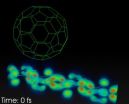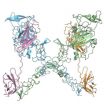(Press-News.org) A compound in saliva, along with common proteins in blood and muscle, may protect human cells from powerful toxins in tea, coffee and liquid smoke flavoring, according to results of a new study led by investigators at the Johns Hopkins Kimmel Cancer Center.
The findings, reported online May 19 in Food and Chemical Toxicology, suggest that people naturally launch multiple defenses against plant chemicals called pyrogallol-like polyphenols or PLPs found in teas, coffees and liquid smoke flavoring. The presence of these defenses could help explain why PLPs are not crippling cells and causing illness as would be expected from their toxic punch and widespread use, the researchers say.
Last year, Johns Hopkins investigator Scott Kern, M.D., and his colleagues demonstrated that PLPs found in everyday foods and flavorings could do significant damage by breaking strands of DNA, the carrier of all genetic information. The impact of the toxins was so strong--in some cases producing 20 times the damage of chemotherapy drugs delivered to cancer patients--that the researchers immediately thought to find out why there wasn't more damage, and to look for ways that cells might be fighting back.
"If these chemicals are so widespread--they're in flavorings, tea, coffee--and they damage DNA to such a high degree," Kern said, "we thought there must be defense mechanisms that protect us on a daily basis from plants we choose to eat."
Kern and colleagues found that an enzyme in saliva called alpha-amylase, the blood protein albumin, and the muscle protein myoglobin all protected cells from DNA breakage by tea, coffee and isolated PLPs. The researchers identified the amount of DNA damage in the cells by looking for high activity levels of a gene called p53. The gene helps repair DNA damage.
"It was quite easy to uncover a few of these protective substances against the tested cancer therapeutic drugs, which suggests there may be many more layers of defenses against toxins," said Kern, the Kovler Professor of Oncology and Pathology at the Johns Hopkins University School of Medicine.
Kern emphasized that the saliva enzyme and the proteins did not protect against chemotherapeutic drugs, which can also damage DNA, a fact suggesting that defenses against PLPs may have evolved over time, in response to natural plant compounds that have been part of human diets for a long time.
Surprisingly, he says, the cells did not seem to need these protein protectors after a period of exposure to the toxins. "After about two weeks we found it difficult to get the cells to be damaged by the same chemicals, even if they were damaged by the chemicals weeks earlier," Kern explained. "They seem to have some innate ability to respond to the damage or sense it and somehow protect themselves against it, even in the absence of albumin, muscle proteins or saliva components."
"It made us wonder, do people who eat the same PLP-containing diet day after day develop a natural cellular protection to the toxins," Kern asked, "so that, as has been said before, what doesn't kill us makes us stronger?"
The researchers plan to explore further how albumin, myoglobin and salivary alpha-amylase protect against PLPs and learn more about other possible innate defenses against the chemicals. Kern also plans to study how these natural defenses might be circumvented in some people, causing cancers or other illnesses.
Kern says the findings also invite speculation as to whether a morning cup of coffee might be less harmful to our bodies if it is enjoyed with the protective myoglobins in a few strips of bacon. Or if eating smoked meats might be less toxic if they are tasty enough to make a diner salivate. But Kern cautions that these ideas are just that--speculation.
INFORMATION:
This study was supported by the National Institutes of Health's National Cancer Institute (CA62924) and the Everett and Marjorie Kovler Professorship in Pancreas Cancer Research.
On the Web:
Journal article: http://dx.doi.org/10.1016/j.fct.2014.05.002
Related news release: Cancer Biologists Find DNA-Damaging Toxins in Common Plant-Based Foods
Johns Hopkins Kimmel Cancer Center
Office of Public Affairs
Media Contacts:
Vanessa Wasta
410-614-2916
wasta@jhmi.edu
Amy Mone
410-614-2915
amone@jhmi.edu END
Compounds in saliva and common body proteins may fend off DNA-damaging chemicals
2014-05-30
ELSE PRESS RELEASES FROM THIS DATE:
New satellite animation shows the end of Hurricane Amanda
2014-05-30
VIDEO:
This animation of visible and infrared imagery from NOAA's GOES-West satellite shows the weakening of Hurricane Amanda from May 28 to its dissipation on May 30.
Click here for more information.
A new animation of visible and infrared imagery from NOAA's GOES-West satellite shows the weakening and dissipation of the Eastern Pacific Ocean's Hurricane Amanda. The animation that runs from from May 28 to May 30 was created at NASA/NOAA's GOES Project at NASA's Goddard Space ...
Hepatitis C reactivation doesn't worsen survival for HIV+ patients diagnosed with lymphoma
2014-05-30
CHICAGO, IL (May 30, 2014)—More than a quarter of HIV+ patients are also infected with the Hepatitis C virus (HCV), which may complicate treatment and care decisions after a cancer diagnosis. The specifics of those complications haven't been well-researched in the past. Results from a new Fox Chase Cancer Center study on this patient population may start filling in that gap.
Fox Chase Hematologist and Medical Oncologist Stefan K. Barta, MD, MS, MRCP – who led the study – analyzed data from HIV+ patients diagnosed with lymphoma, collected over 17 years, to better understand ...
Identification of central nervous system involvement for patients with AIDS-related lymphomas
2014-05-30
CHICAGO, IL (May 30, 2014)—Patients with AIDS-related lymphomas (ARL) may face an increased risk of central nervous system involvement (CNSi) compared to other lymphomas. The effect of CNSi on survival outcomes, however, hasn't been thoroughly examined until now.
In a new study led by Fox Chase Cancer Center Hematologist and Oncologist Stefan K. Barta, MD, MS, MRCP, researchers report that CNSi – identified at the time of an ARL diagnosis – does not appear to have an impact on overall survival. Dr. Barta's collaborators will present the findings at the 50th Annual Meeting ...
Moffitt Cancer Center instrumental in new clinical guidelines for cancer-related fatigue
2014-05-30
TAMPA, Fla. (May 30, 2014) – Fatigue is a debilitating problem for cancer patients undergoing treatment; however, it also poses a huge detriment after treatment and can significantly affect quality of life. Approximately 30 percent of cancer patients endure persistent fatigue for several years after treatment, according to an American Society of Clinical Oncology Expert Panel co-chaired by Paul Jacobsen, Ph.D., associate center director of Population Sciences at Moffitt Cancer Center.
ASCO created the panel to develop assessment, screening, and treatment guidelines for ...
First real time movies of the light-to-current conversion in an organic solar cell
2014-05-30
VIDEO:
Real time quantum simulation of the conversion of light into current in an organic solar cell composed of a polymer chain, and a Fullerene buckyball. The movie lasts for about...
Click here for more information.
Photovoltaic cells directly convert sun light into electricity and hence are key technological devices to meet one of the challenges that mankind has to face in this century: a sustainable and clean production of renewable energy. Organic solar cells, using polymeric ...
Research details how developing neurons sense a chemical cue
2014-05-30
Symmetry is an inherent part of development. As an embryo, an organism's brain and spinal cord, like the rest of its body, organize themselves into left and right halves as they grow. But a certain set of nerve cells do something unusual: they cross from one side to the other. New research in mice delves into the details of the molecular interactions that help guide these neurons toward this anatomical boundary.
In an embryo, a neuron's branches, or axons, have special structures on their tips that sense chemical cues telling them where to grow. The new findings, by ...
Study highlights side effects felt by BRCA mutation carriers after cancer risk-reducing procedure
2014-05-30
PHILADELPHIA — The majority of women with cancer causing BRCA1 and BRCA2 mutations experience sexual dysfunction, menopausal symptoms, cognitive and stress issues, and poor sleep following prophylactic removal of their Fallopian tubes and ovaries - a procedure known as risk-reducing salpingo-oophorectomy (RRSO) - according to results of a new study from the Abramson Cancer Center and the Perelman School of Medicine at the University of Pennsylvania. The team's findings, which reaffirm the need for a better understanding of how to manage long-term effects of the risk-reducing ...
Can narcissists be moved to show empathy?
2014-05-30
Researchers at the University of Surrey and the University of Southampton have investigated whether narcissists can elicit empathy for another person's suffering. It has been well documented that narcissists lack empathy, but why is that the case, and do they have the capacity to change that behavior? The research is published in Personality and Social Psychology Bulletin.
Characterizing narcissism
When we think of narcissism most of us can all think of a colleague, friend, or former significant other that would fit the description; "A bit full of themselves, self-centered, ...
Narcissists can feel empathy, research finds
2014-05-30
Narcissists tend to lack empathy, which can cause problems for themselves, the people around them and society in general. However, new research published today from the University of Surrey, suggests that with the right focus, people with narcissistic tendencies can feel empathy for another person's suffering. This may be important in helping to prevent the often violent or anti-social behaviours that some narcissists are prone to and the crimes that are committed as a result.
The research, published in Personality and Social Psychology Bulletin, studied participants ...
Eating prunes can help weight loss
2014-05-30
Research by the University of Liverpool has found that eating prunes as part of a weight control diet can improve weight loss.
Consumption of dried fruit is not readily recommended during weight loss despite evidence it enhances feelings of fullness.
However, a study by the University's Institute of Psychology, Health and Society of 100 overweight and obese low fibre consumers tested whether eating prunes as part of a weight loss diet helped or hindered weight control over a 12-week period.
It also examined if low fibre consumers could tolerate eating substantial ...


